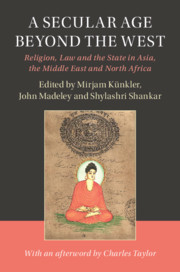The Rule of Law in the Islamic Republic of Iran
After Iran's 1979 Revolution, Ayatollah Khomeini denounced the secular legal system of the Pahlavis and pledged his commitment to distinctly Islamic conceptions of law and justice: the application of both the shariʿa and the rule of law (hākemiyat-e qānun) became major ideological pillars of the Islamic Republic. This precipitated the Islamization of the legal system, the judiciary and the courts, a process which still continues today and is the subject of intense ideological and political contestation. The Rule of Law in Iran is the first comprehensive analysis of judicial and legal institutions of the Islamic Republic of Iran in their social, political and historical contexts. Scholars and practitioners of law, many with experience of working in Iran, shed light on how the rule of law has fared across a variety of areas, from criminal law to labour law, family law, minority rights, policing, the legal profession, the visual and performing arts, trade law, and medicine.
- Provides the first comprehensive detail-oriented analysis of judicial and legal institutions of the Islamic Republic of Iran in their historical, social and political contexts
- Sheds light on legal practice in areas that have received little attention in socio-legal studies: medical law, the regulation of the performing and visual arts, the legal profession, and labor and trade law
- Appeals to readers in sociolegal studies, Islamic Studies, legal anthropology, and comparative politics, and anyone interested in the law at work in authoritarian contexts
Reviews & endorsements
‘This meticulously researched volume illuminates the complexity and uneven quality of the rule of law across different spheres of law under the Islamic Republic. After the 1979 revolution, the rule of law in Iran suffered in chiefly two ways: one, due to the discriminatory laws that were passed, such as those based on gender and religion; and two, due to the poor implementation of the law, wherein the enforcement of laws by the government is subject to political considerations. Readers of this rich and expertly edited collection cannot help but conclude that improvements in the rule of law will not materialize until the Iranian constitution is reformed, or replaced.’ Shirin Ebadi, 2003 Nobel Peace Laureate
‘This is an unprecedented work of meticulous, profound research and importance. Co-editors Enayat and Künkler have produced an edifying volume on the rule of law in Iran under the Islamic regime. It is a diverse, rich insight that manages to remain balanced and nuanced, while also providing crucial and vivid context of Iranian society, culture and politics. A powerful, essential book – particularly in the aftermath of Iran’s Woman Life Freedom movement.’ Ramita Navai, author of City of Lies: Love, Sex, Death and the Search for Truth in Tehran
‘Never has there been such an all-encompassing publication on Iranian law, its judicial system and its long-standing human rights violations. This book is a must read for anyone interested in the development of the Iranian modern legal complex and its authoritarian nature. An understanding of the judicial system, in all of its aspects, is crucial for understanding how the Islamic Republic has managed to exert its level of control. This book provides the most comprehensive view into the roots of the Islamic Republic’s repression of Iranians.’ Shadi Sadr, human rights attorney and Executive Director of Justice for Iran
‘The rejection of secular law in favour of velayat-e faqih (guardianship of the Islamic jurist) was a central goal of the Islamic Republic of Iran after the 1979 revolution. The imposition of shari’a law by a self-appointed clerical class conceived State institutions as a curious combination of nativist normativity and modern authoritarianism. The Rule of Law in the Islamic Republic of Iran is a valuable contribution to understanding how this unique legal system has evolved, its legacy of violence and repression, and its implications for the democratic transformation of Iran. Comprehensive and original, this volume will serve as a touchstone for comparative and systematic research on the legal and judicial politics of Iran for years to come.’ Payam Akhavan, Payam Akhavan SJD OOnt FRSC, Chair in Human Rights at the University of Toronto. Associate Member of the Institut de droit international
‘A comprehensive examination of how the legal system of the Islamic Republic functions and has affected life in Iran has been long overdue. The essays in this volume contain not only in-depth discussions of the various legal codes themselves, but also provide invaluable insights into their application in practice. Bringing together authors from different scholarly and political backgrounds, some of whom have had direct experience of Iranian courts and prisons, the volume gives invaluable insights into a poorly understood subject. As dissatisfaction with the ideological premises of the Islamic Republic is increasing among Iran’s citizenry, a sober analysis of how the state’s official ideology has impacted society, especially its most vulnerable sectors, is a very welcome addition to the literature on contemporary Iran.’ Houchang E. Chehabi, author of Iranian Politics and Religious Modernism: The Liberation Movement of Iran under the Shah and Khomeini
‘Post-revolution’s overhaul of laws and the judicial apparatus are often treated as static, uniformly inspired, and sudden. By taking into account the surrounding and evolving sociopolitical and juridical contestations, this collection of essays, instead, offers nuanced insight into the way the Islamic Republic of Iran has used, abused and gradually transformed its legal and judicial institutions in all areas into which the long arm of its distinctly Islamic conception of the rule of law and administration of justice has increasingly intruded. This is a difficult and depressing read but a necessary one for understanding not only the country’s legal and judicial system and associated institutions but also the evolution and trajectory of the Islamic Republic itself.’ Farideh Farhi, , author of States and Urban-Based Revolutions in Iran and Nicaragua
‘This book delves into the under-examined legal aspects of Iran’s system post-1979 revolution, a perplexing merging of traditional and modern elements. It sheds light on how the regime has infused Islamic principles into the legal system, formalizing laws while sidestepping political accountability. With contributions from scholars who had first hand experience with the law in Iran, it highlights important legal issues that impact the everyday lives of Iranians, such as law enforcement, reproductive rights, and property regulation, steering clear of simplistic interpretations of Iran’s legal framework. Through detailed case studies, the book reveals the development of a legal structure that adheres to Islamic norms but obstructs the rule of law from ensuring government accountability, offering profound insights into Iran’s complex and distinctive legal landscape.’ Kian Tajbakhsh, author of Creating Local Democracy in Iran: State Building and the Politics of Decentralization
Product details
April 2025Hardback
9781108481427
288 pages
228 × 152 mm
Not yet published - available from April 2025
Table of Contents
- 1. Governing the Law in the Islamic Republic of Iran Mirjam Künkler
- 2. Law Enforcement and the Judiciary in Post-Revolutionary Iran Saeid Golkar
- 3. Rule of Law or Rule by Law? Iran's Bar Association as a pawn in Islamic-republican Contestations Mirjam Künkler
- 4. Shiʿi Family Law under the Rule of Law? The Iranian Model and Current Approaches in the Shiʿi World Hannah L. Richter
- 5. The Islamic Penal Code of 2013: Traditions and Innovations Silvia Tellenbach
- 6. The Administration of Criminal Justice in Iran: Ideology, Judicial Personalism and the Cynical Manipulation of Security Drewery Dyke and Hadi Enayat
- 7. Reform from within? Hākemiyat-e Qānun from the Reformist Era until 2022 Mirjam Künkler
- 8. Iran's Religious and Ethnic Minorities in the Eyes of the Judiciary and the Security Apparatus Shahin Milani
- 9. Legal Barriers to Key Populations Accessing HIV/AIDS Services in Iran, and Creative Responses to Overcome Them Arash Alaei and Kamiar Alaei
- 10. The Problem of Overcrowded Prisons in the Islamic Republic of Iran Anna Enayat and Hadi Enayat
- 11. Labour Rights in Post-Revolutionary Iran M. Stella Morgana
- 12. The Effects of the JCPOA, and Subsequent US Withdrawal, on Iranian Law Faezeh Manteghi and Seyed Emadeddin Tabataba'i
- 13. Multi-layered Mechanisms of Control and Censorship of Arts and Culture in the Islamic Republic of Iran Roozbeh Mirebrahimi and Azadeh Pourzand
- 14. The Legal Situation Regarding Assisted Reproduction in Iran: Current Developments and Concerns Shirin Naef
- 15. Conclusions: Regressions and Progressions in the Rule of Law of the Islamic Republic of Iran Hadi Enayat and Mirjam Künkler.

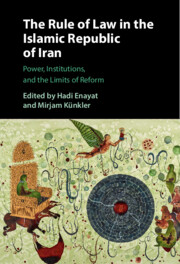
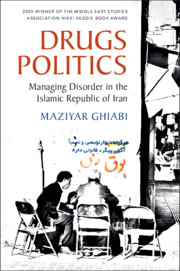
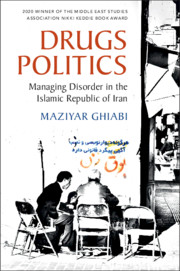
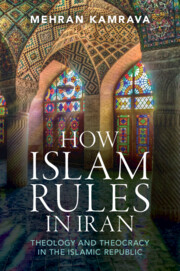
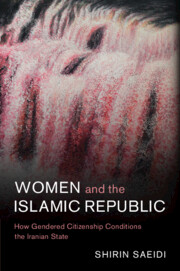

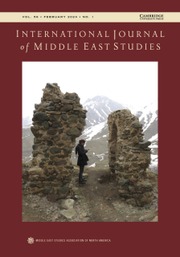
.jpg)
